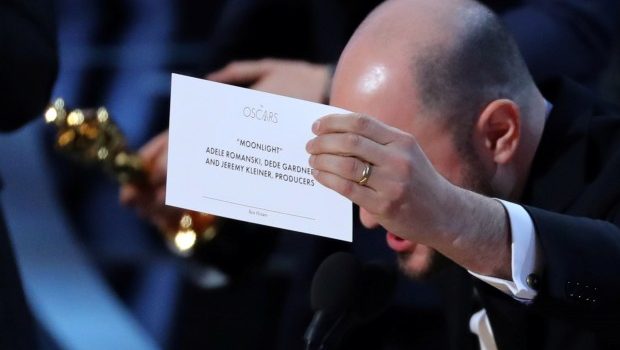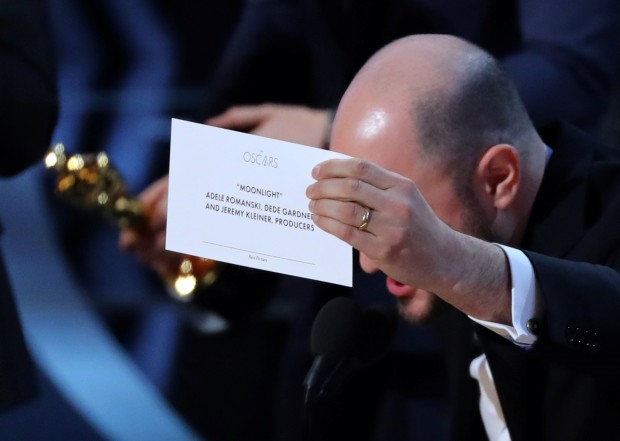

Oscars blunder prompts probe as ‘Moonlight’ takes best picture
EntertainmentNews Feb 27, 2017 Wire Editor

By Jill Serjeant
LOS ANGELES, Feb 27 (Reuters) – Oscar officials on Monday were investigating an embarrassing mix-up over the best picture award, which eventually went to African-American coming-of-age drama “Moonlight,” after a ceremony studded with political jokes and minor mishaps.
In a mistake that stunned the Dolby Theatre crowd in Hollywood and a television audience worldwide, presenters Warren Beatty and Faye Dunaway at first said the winner was romantic musical “La La Land,” the presumed best picture favorite.
As both films’ casts stood awkwardly on stage, Beatty explained he had received the wrong envelope.
PricewaterhouseCoopers, which oversees the ballots, confirmed the error and apologized.
“We are currently investigating how this could have happened, and deeply regret that this occurred,” the professional services firm said in a statement while apologizing to “Moonlight,” “La La Land,” Beatty, Dunaway and Oscars viewers.
Officials from the Academy of Motion Picture Arts and Sciences were not available to comment.
“Is that the craziest Oscar moment of all time?” Stone, who won the best actress award for her “La La Land” role as a struggling actress, told reporters backstage.
While the best picture mix-up took top spot in the evening’s embarrassments, the ceremony was beset with smaller blunders.
During the “in memoriam” segment, the name of celebrated Australian costume designer Janet Patterson, who died last year, was accompanied by a photo of Jan Chapman, an Australian movie producer who is alive and well.
There was also a hit for Auli’i Cravalho, the 16-year-old actress and lead voice in Disney’s animated film “Moana.” While performing the best song-nominated, “How Far I’ll Go,” Cravalho was struck on the head with a flag waved by a backup dancer.
“Moonlight,” a tale about a young boy struggling with poverty and his sexuality in Miami, also brought a supporting actor Oscar for first-timer Mahershala Ali.
Viola Davis won for her supporting role as a long-suffering housewife in African-American family drama “Fences.”
The recognition for both the actors and their films was a stark contrast to the 2016 Academy Awards, when no actors of color were even nominated.
“Moonlight” producer Adele Romanski said she hoped the movie would inspire “little black boys and brown girls and other folks watching at home who feel marginalized.”
“LA LA LAND” SWEEPS SHOW
“La La Land” began the evening with a leading 14 nominations and emerged with six wins, including for its score and theme song “City of Stars.” Director Damien Chazelle, 32, became the youngest person ever to win for best director.
“Manchester by the Sea” star Casey Affleck was named best actor, winning his first Oscar despite 2010 sexual harassment allegations that resurfaced during awards season. Affleck denied the allegations, which were settled out of court.
“Man, I wish I had something better and more meaningful to say,” said Affleck, who played a heart-broken father in the movie. ” … I’m just dumbfounded that I’m included.”
The best picture mistake during Hollywood’s biggest night seemed to eclipse the prior three hours of a show peppered with jokes about U.S. President Donald Trump.
The gibes capped an awards season marked by celebrities’ fiery protests of Trump’s policies.
Oscars host Jimmy Kimmel fired off political zingers and even tweeted at the Republican president, getting no immediate response.
Several celebrities wore blue ribbons on Sunday in support of the American Civil Liberties Union advocacy group, which worked to get Trump’s bid to ban travelers from seven majority Muslim nations blocked in U.S. courts.
But for the most part, the speeches were mild or made general pleas for tolerance rather than direct attacks on Trump.
Iranian director Asghar Farhadi was an exception. His drama “The Salesman” was named best foreign-language film, but Farhadi boycotted the ceremony because of Trump’s travel ban.
In a speech given on his behalf by Iranian-American space expert Anousheh Ansari, Farhadi said his absence was due to “an inhumane law that bans entry into the U.S. … Dividing the world into the ‘us’ and ‘our enemies’ categories creates fear, a deceitful justification for aggression and war.” (Additional reporting by Laila Kearney in New York; Editing by Daniel Wallis and Lisa Von Ahn)
